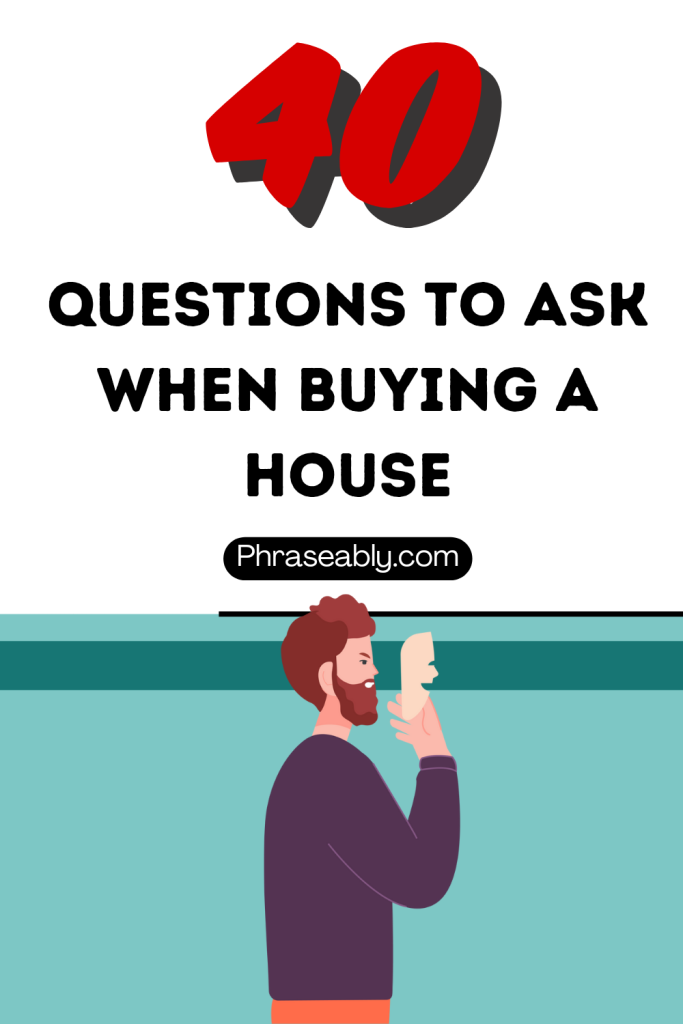If it’s your first time buying a house, I can imagine the excitement you must be feeling. You’re likely over the moon with joy. However, I understand if you’re feeling overwhelmed too.
Getting a new house can be quite challenging. There’s always the apprehension and the many questions you need to ask. Nevertheless, satisfying your doubts is necessary to give you the right frame of mind to make the right decision.
You must make the right inquiries to avoid getting a home you wouldn’t enjoy, wasting your resources and time.
Conversely, we know that it might not be easy knowing what questions to ask and who to ask, especially if you are a first-time buyer.
So, in this guide post, I’ve listed 40 questions to ask when buying a house. They’ll guide you in making the right decision to get the dream house you desire.
40 Questions to Ask When Buying a House
There are tons of questions to ask when buying a house. However, there are important ones that must be asked to guide you, and that’s what I’ll be listing in this article.
From the reason you need a house, the total cost you need, enquiring on the health of the house, the safety of the neighborhood, and taxes to the legal process involved, this article will take care of the important details.
Below are 40 questions to ask when buying a house:
- Why exactly am I getting my own house?
- What kind of house fits my budget?
- How large of a house do I need?
- How urgently do I need a home?
- What can I afford as a down payment?
- Where do I want the house?
- What’s the standard of living in the area I’m getting the house?
- Am I getting a house that needs refurbishing?
- How much am I budgeting for closing?
- What is my budget for moving?
- Why is the house being sold?
- How long has it been on sale?
- What’s the cost of maintenance in the house?
- How is the neighborhood?
- Is the area isolated?
- Are primary facilities close by?
- money
- How is commuting in that area?
- How is the internet connectivity in the area?
- Is it easy to get a job there?
- Is the area prone to natural disasters?
- Is it radon-safe?
- Is it asbestos-free?
- Is it well insulated?
- Are the ground and grasses contaminant-free?
- How is the water?
- Am I getting insurance?
- Is there any problem I need to know?
- What is the legal process involved?
- What am I going to find there?
- Is the house damp?
- Why are there fresh paintings?
- Is the structure sound?
- How old is the roof?
- What is the drainage system like?
- Has the property undergone any major repairs?
- Are there any shared spaces?
- How old is the house?
- What is the property tax?
- What are the costs of utilities?
Why exactly am I getting my own house?
One of the first questions you should ask yourself in the process of getting a house is why you want your own house.
It might sound like a ridiculous question, however, when you look more deeply, you’ll find out not many people have good reasons for getting their own house.
Some might feel they’re ready because their friends are getting into their new home, and some feel it’s time because their landlord has been a nuisance.
So, ensure you take time and reflect on the reason you want to take that huge step to get your own home to make sure you’re making the right investment at the right time.
What kind of house fits my budget?
Before you jump on your feet and pay for a house, you should know how much is in your pocket and the kind of home that will fit your budget.
There are numerous kinds of properties on the market, and going to search without a budget or knowing the type of house you should look out for will frustrate you.
You might end up roaming the housing market aimlessly. So, ensure you have a budget and have an idea of what will fit into the budget, so you can ask the right kind of questions.
Will I exceed my budget, and how much would I be exceeding?
Another important question you should ask yourself is if you’ll exceed your budget and by what percentage will you do that.
First, we’ve already established that having a budget is necessary. However, we understand that going for what we need can sometimes not fit into the budget.
So, if you’re not working on a very tight budget, it’s good to keep extra money in case you might need it. When getting a house, you must get what you’ll be comfortable with to avoid regrets.
Therefore, if you can afford to go beyond your budget, you should have this at the back of your mind and know the percentage you cannot exceed.
How large of a house do I need?
How large should the house be? When getting a new home, you should consider the size you’re getting. Do you have a family? How large is your family? Are you starting a family soon?
What can my budget afford? These are some of the questions you should ask yourself to determine the size of the house you’re going for.
How urgently do I need a home?
Another question to ask is how urgently you need a home. If you’ll be starting a family soon and you feel you need something bigger, then it’s a great reason.
However, if the current place you’re staying still suits your needs, and considering your finances, you might discover you don’t need a home urgently.
What can I afford as a down payment?
Another question you should ask yourself is what you can afford as a down payment. If you can’t afford to make complete payment at once, many sellers agree to a down payment.
So, you should have a budget for that also. It’s necessary to have that at the back of your mind when negotiating with the seller, to use the resources you have wisely.
Where do I want the house?
Another important question to ask when getting a house is the location. Where do you want the house?
It’s very important to have the location of where you want the house before searching the market. Some of the factors that affect location are the location of your job, the proximity of important facilities like school for your kids, hospital, mall, and church if you do church.
What’s the standard of living in the area I’m getting the house?
Another important factor to consider when getting a house is the standard of living in the area.
If you’re moving to a new environment, you should ask what the cost of living is in that area to see if it’s something you can handle.
Am I getting a house that needs refurbishing?
Another important question is if you’ll be getting a house that needs refurbishing.
Many old houses fall into this category. So, if you’re looking for something cheap, consider the work that needs to be done. If you don’t want a property that needs refurbishing, then your target is new houses- not more than 10-15 years old.
How much am I budgeting for closing?
Knowing the total cost you’ll be paying is another thing to factor into your budget.
Other payments like appraisal fees, title fees, home inspections, etc, are some of the costs you should have at the back of your mind when making your budget.
What is my budget for moving?
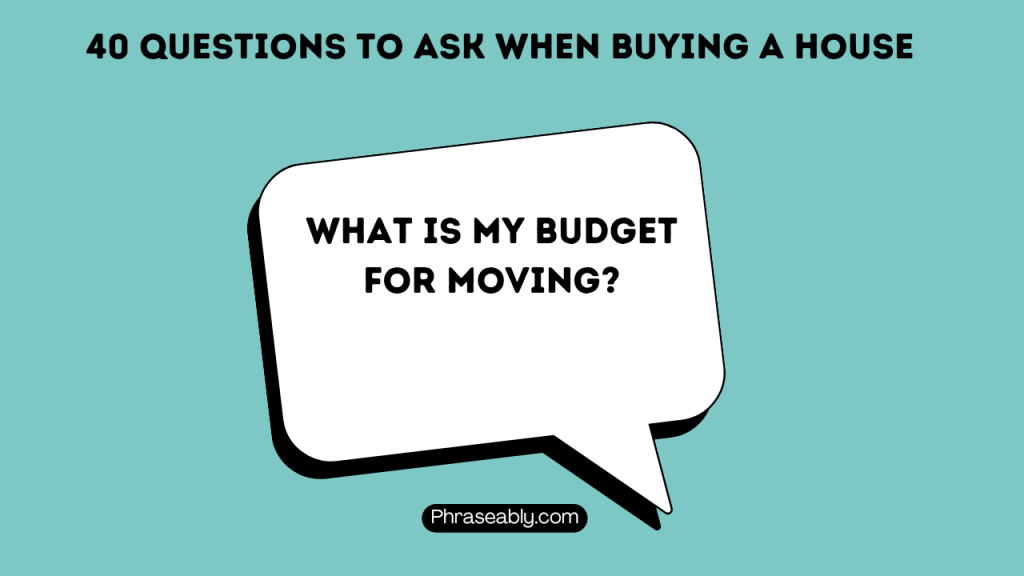
When buying a house, you should also include the cost of moving in your budget.
If you’re packing to a very far place, you should know the cost of moving will be very high, except you’re packing into a furnished house and might not need to move anything.
Moving costs anything from $200-$12,700. This cost can be higher depending on the distance and quantity of items being moved.
Why is the house being sold?
One very important question you shouldn’t fail to ask is why the house is being sold. This question is a delicate one and will need wisdom to go about it.
You might need to inquire from more than one person if you think the seller or the agent isn’t straightforward.
How long has it been on sale?
How long a house has been on sale is another factor that can affect your purchase of a house.
Knowing why a house is on sale and how long it has been on sale is very important. If the house has been on the market for a long time, it should keep you worried.
So, ensure you do your due diligence before letting go of your money.
What’s the cost of maintenance in the house?
Another thing you should look out for when purchasing a house is the cost of maintenance.
Ensure you ask the previous owner what the cost of maintenance is. However, if no one has lived in it for a long time, ensure you inspect to see what you’re up against.
How is the neighborhood?
Another factor that shouldn’t be neglected when purchasing a house is the neighborhood. “How is the neighborhood?” is an important question to ask.
Is it lively? Is it safe for your kids? Is it friendly? You wouldn’t want to move to a place where you don’t feel comfortable.
Is the area isolated?
Check out the area where you’re looking to buy. Is it isolated? As much as you might prefer a quiet neighborhood, living in an isolated area can be dangerous.
So, check how far apart the houses or buildings are. Look out for the number of people that ply the street to see if you’re okay with that.
Are primary facilities close by?
Primary facilities include health, education, and market facilities.
Is a hospital nearby? If you have children, how close are the schools around? Is there a store where you can easily get food items and other important items?
Check for these things before giving out your money.
How is commuting in that area?
What are the available means for commuting? Is it easy to commute to your workplace, out of town, and within the city?
What is the road like? These are the questions to ask and things to consider when buying a house.
How is the internet connectivity in the area?
Does the area have a good network? Internet connectivity is another thing you should check out when moving to a new place.
You wouldn’t want to pack in only to discover that you can’t connect to the internet until you leave your house. So, ensure you find out about the network connection in that area before paying.
Is it easy to get a job there?
If you’ll be needing a new job, what are your chances that you’ll easily find one?
What kind of industry is there? What are the kinds of jobs that are done there? Do you think you’ll easily get what you’re looking for?
Is the area prone to natural disasters?
Natural disasters are not easily controlled. So, if you’re purchasing a house, you should find out the chances of natural disasters occurring there.
Flooding, earthquakes, erosion, etc are disasters that can cause havoc. So, check if it’s something that can be managed before buying. You should avoid such areas when you can.
Is it radon-safe?
Radon is a radioactive gas- odorless and colorless, that’s released from the breakdown of rock.
It can be found in houses; and above safe levels, poses a risk of lung cancer. So, check if a radon test has been carried out and take the necessary measures if you discover the building contains the gas if you’re looking to continue purchasing.
Is it asbestos-free?
Asbestos is a chemical substance that has been used in construction because of its resistance to heat and corrosion.
However, it has been discovered that when released in the air it causes some type of cancer. So since 1989, it has been banned from being used in homes and public places.
Therefore, especially if you’re purchasing an old building enquire about if an inspection for the chemical has been carried out.
Is it well insulated?
Another thing you shouldn’t forget to ask is if the house you’re looking to buy is well-insulated.
How well protected is it against the element? Are the ceiling and walls well insulated? Poor insulation incurs extra costs because your HVAC system will need to work harder. So, ensure you make your findings and make proper negotiations.
Are the ground and grasses contaminant-free?
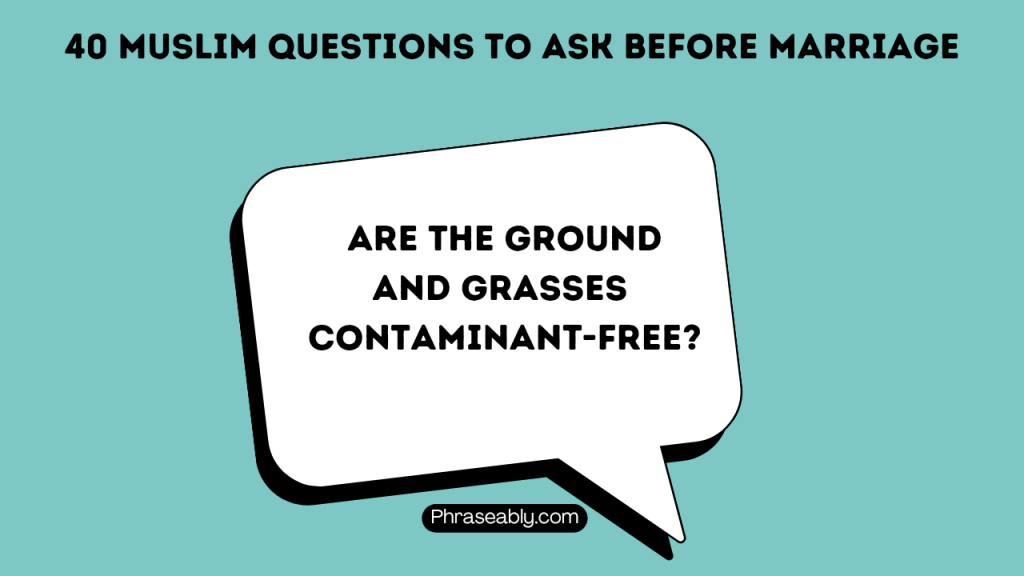
Ensure you also find out if the soil and grasses have been inspected for contamination.
Paints and chemicals used in the house can leak into the ground and contaminate the soil and grasses, making it unsafe, especially for children and pets.
How is the water?
Water is essential, we already know that. So, ensure you ask the seller before buying a house how the water is, especially if people have not lived in the house for some time.
Ensure you’ll be using safe water.
Am I getting insurance?
Another very important question to ask is about insurance. Ask if you’ll be getting insurance for the home, and if not, you can ask how you can start yours.
Having your home insured is very important. So, if you want one don’t forget to ask questions.
Is there any problem I need to know?
Especially, if you’re buying an old house, ensure you ask this question.
Even if the house looks good, don’t forget to ask the seller if there’s any problem you need to know, so you decide if you’ll be going for it.
What is the legal process involved?
The legal processes involved in purchasing a house can differ slightly across each seller and each vicinity or state.
So, make sure you have this at the back of your mind while searching the house market.
What am I going to find there?
Don’t forget to ask what things you’ll find in the house. While there are no specific rules to this thing, certain appliances and equipment are often left by homeowners when they’re moving out and selling.
So, ensure you ask about the things you’ll find to know what you’ll need.
Is the house damp?
Don’t forget to check for dampness or signs of mold. That’s why it’s best to check for houses during the rainy season, to see how affected it is by the rain.
Also, you should be smart when checking for dampness or mold because they might be covered by fresh paint.
Why are there fresh paintings?
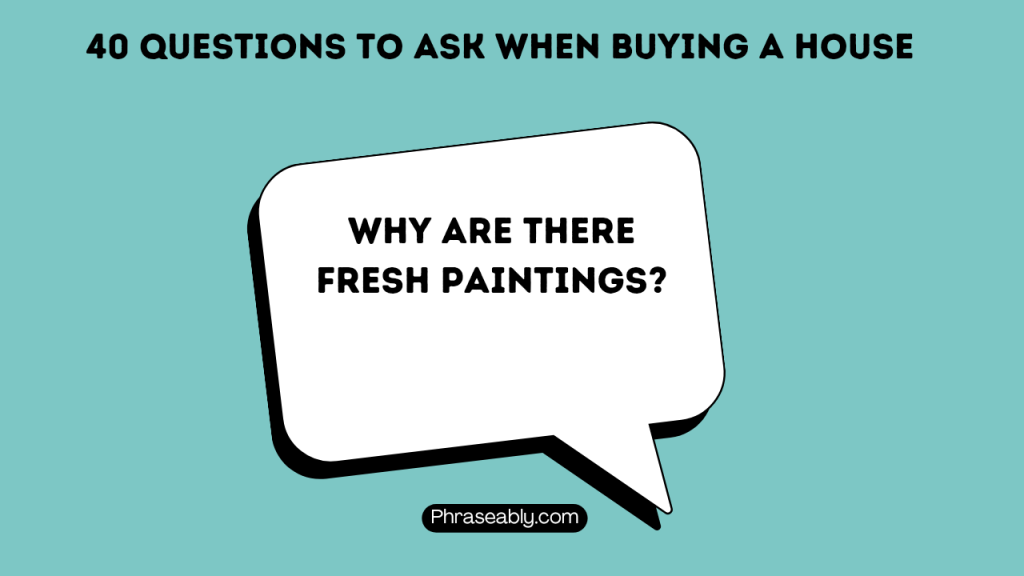
If you notice fresh paint or very neat paint, ensure to ask questions because sometimes they might just be a way to cover up cracks and mold.
If possible ask for a video of the house before it was painted.
Is the structure sound?
Don’t forget to inquire about the structural soundness. How strong are the windows, check for cracks in the walls, check the ceiling, the stairs, crumbling bricks, etc.
Ensure you carry out a thorough inspection to check for any structural faults.
How old is the roof?
Don’t forget to ask how old the roof is. Most roof types have a lifespan between 15-30 years, depending on the type and the weather conditions in the area.
So, if you’re going for older houses, this question is very important, in case you might need a new roof sooner.
What is the drainage system like?
Don’t forget to ask what type of drainage system is used.
Do your due findings and decide if it’s something you want.
Has the property undergone any major repairs?
One major question you shouldn’t fail to ask is if the property has undergone any major reconstruction.
You wouldn’t want a property that is frequently repaired, it begs the question if it’ll be safe. So, have that at the back of your mind.
Are there any shared spaces?
Don’t forget to ask if there are shared spaces. You wouldn’t want to pack in and find out you share your backyard with your neighbor.
How old is the house?
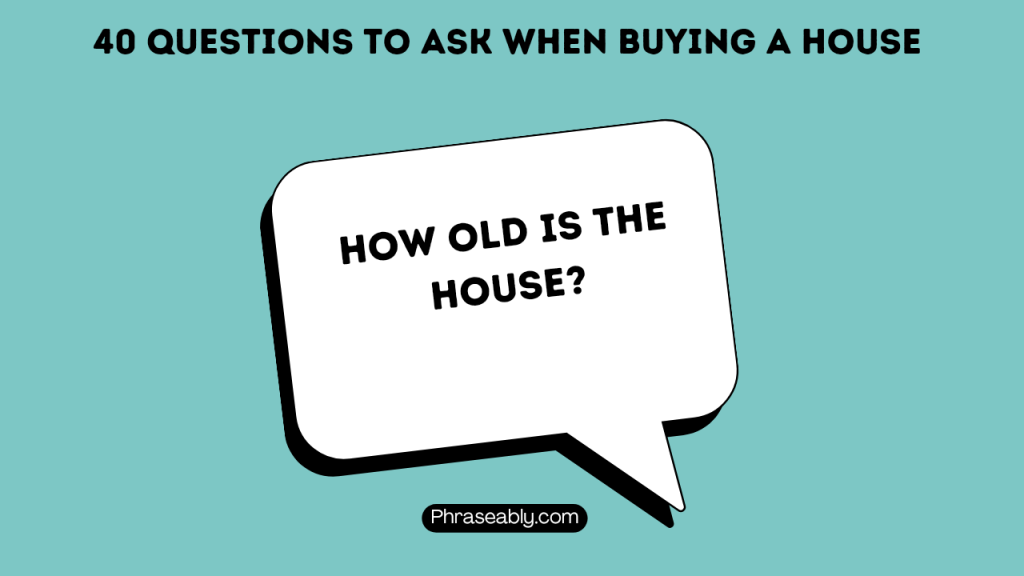
A question you shouldn’t fail to ask is how old is the house. Knowing the age can influence your choice.
What is the property tax?
Don’t forget to ask what tax needs to be paid when purchasing a home.
This question is very important because taxes can form a bulk of the payments you make monthly.
What are the costs of utilities?
Before buying a house, you should know how much you’ll be paying for utilities.
From electricity, water, and gas, the prices of these utilities differ across areas and the type of house you’re moving into.
